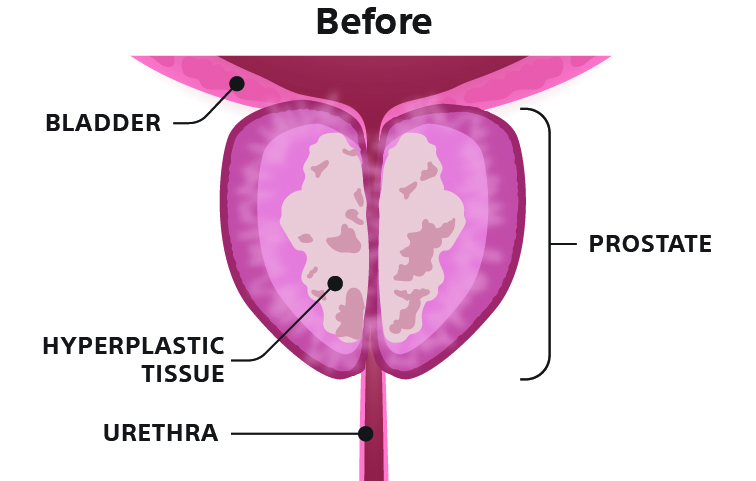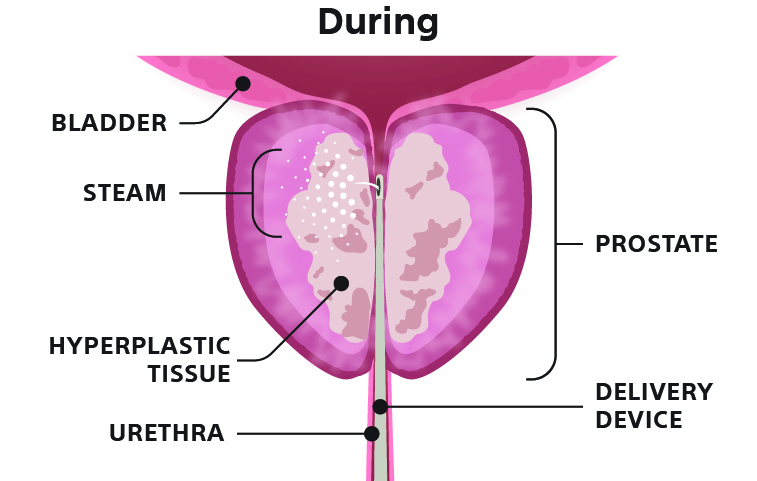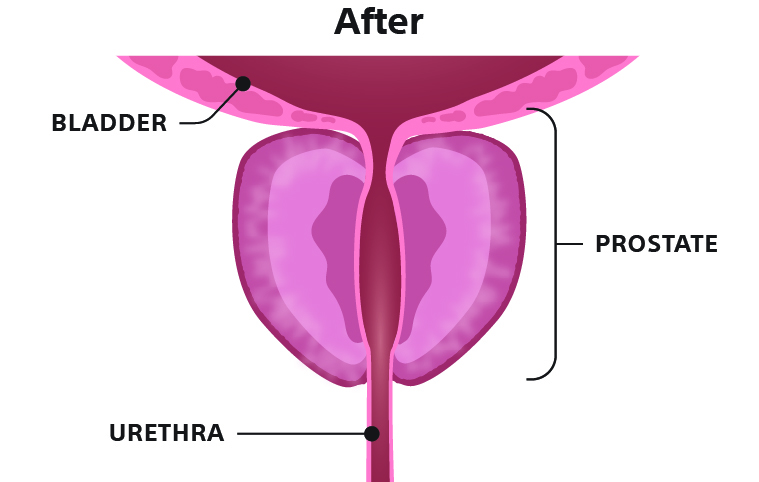Rezum, BPH Treatment
Rezum Water Vapor Therapy is a minimally invasive procedure that treats the source of benign prostatic hyperplasia (BPH) without surgery or drugs and their side effects.
What is BPH and who does it affect?
BPH is an enlargement of the prostate gland affecting about 50% of men by age 60, and up to 90% of men by age 85. Common symptoms of BPH include:
- Frequent need to urinate
- Urgent feeling to urinate
- Weak or irregular urine stream
- Straining to urinate
How does Rezum Therapy work?

At The Oregon Clinic, Rezum is performed as an in-office procedure by Urologists Dr. Gregory Cost, Dr. Sajal Dutta, Dr. David Jiang, Dr. Jin-Hee Kim, Dr. Gilbert Klemann, Dr. Lance Marr, Dr. Daniel Miller, Dr. Jacob Richard, and Dr. Amanda VanDlac.
During each 9-second treatment, sterile water vapor is released into targeted prostate tissue. The stored energy in the steam destroys the treated tissue upon contact. The number of 9-second treatments you will need depends on the size of your prostate, but most patients typically receive between two to six.
Over time, your body absorbs the treated tissue, shrinking the prostate as part of the natural healing process. With the extra tissue removed, the urethra opens and reduces BPH symptoms. Your doctor will determine how many treatments you need based on the size of your prostate.
Most patients return to normal activity within a few days of treatment and will start to see symptoms improve within three to four weeks.1 Maximum benefit may be felt within three months.*1,2 Patient responses can and do vary.



How it works
Watch a brief video on how Rezum Water Vapor Therapy works to treat benign prostatic hyperplasia (BPH).
Frequently Asked Questions
Most insurance plans cover Rezum Water Vapor Therapy, but the cost will depend on your insurance company and your plan. After consulting with your physician, contact your insurance provider for specific coverage information.
Clinical studies have shown no reports of new erectile or ejaculatory dysfunction as a result of Rezum Therapy treatment, however there is a possibility that an underlying condition may surface following treatment with Rezum Therapy. Always talk with your urologist about your individual health history.
You and your doctor will discuss a specific treatment plan specific to you, but in general here is what to expect for the Rezum Therapy treatment:
- Your urologist may have you stop taking blood thinners a few days to a week prior to your procedure and may prescribe antibiotics.
- They will also discuss options with you about maximizing your comfort during the procedure. Most patients report relatively minor discomfort during the procedure.1 Rezum Water Vapor Therapy can be performed under oral sedation or local anesthesia and doesn’t require general anesthesia.2
- On the day of the treatment, the actual procedure will take only minutes but plan on spending approximately two hours for the entire appointment.
- Plan to have a driver for your appointment.
After your procedure, continue taking oral antibiotics as prescribed by your doctor. Your doctor may recommend a catheter for a few days to ease urination during healing. Avoid activities that may irritate your prostate.
Consult your doctor for specific recommendations.
If you experience discomfort:
- Take a mild pain medication, as recommended by your doctor.
- Try a warm bath or sitting on a hot water bottle.
- Consider temporarily removing caffeine, chocolate and alcohol from your diet.
Within a few days, you will most likely be able to resume normal activities and most patients will experience noticeable symptom improvement in as soon as two weeks.
Potential risks associated with Rezum Water Vapor Therapy include, but are not limited to: painful or frequent urination, blood in the urine or semen, decrease in ejaculatory volume, urinary tract infection (UTI), inability to urinate or completely empty the bladder, urgent need to urinate, inability to ejaculate, urinary incontinence, inflammation of the epididymis (a tube at the back of the testicle that carries sperm), worsening erectile dysfunction, pain/discomfort with ejaculation, pelvic or penile pain/discomfort, poor or splayed urine stream, inflammation of the prostate gland, scarring and narrowing of the urethra.
In rare cases, the following side effects may occur narrowing of the bladder neck (area of the bladder that connects to the urethra), bladder stone, severe infection.
During the healing phase following the procedure, patients may experience continued or worsening BPH symptoms, which may require the use of a catheter for several days. It is important to talk with your doctor about the benefits and risks associated with Rezum.
You may benefit from Rezum Therapy if you are a male, 50 years of age or older, and with a prostate volume of 30cm2 ≤ 80cm2. Speak with your urologist about your BPH symptoms and treatment goals to see if Rezum is right for you.
References
1 McVary KT, Rogers T, Roehrborn CG. Rezūm water vapor thermal therapy for lower urinary tract symptoms associated with benign prostatic hyperplasia: 4-year results from randomized controlled study. Urology. 2019 Apr;126:171-9.
2 McVary KT, Gange SN, Gittelman MC, et al. Minimally invasive prostate convective water vapor energy (WAVE) ablation: A multicenter, randomized, controlled study for treatment of lower urinary tract symptoms secondary to benign prostatic hyperplasia. J Urol. 2016 May;195(5):1529-38.
3 Barry M, Roehrborn C. Management of benign prostatic hyperplasia. Ann Rev Med. 1997 Feb;48:177-89.